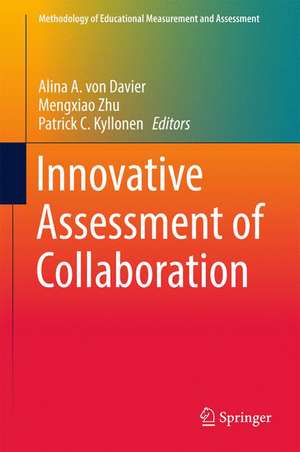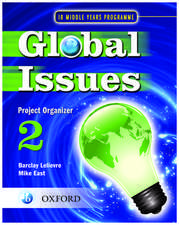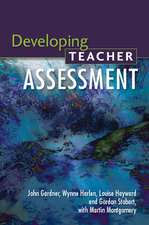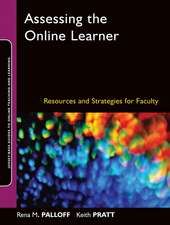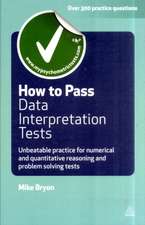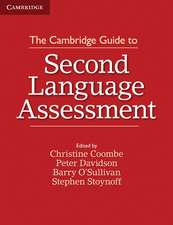Innovative Assessment of Collaboration: Methodology of Educational Measurement and Assessment
Editat de Alina A. von Davier, Mengxiao Zhu, Patrick C. Kyllonenen Limba Engleză Hardback – 10 apr 2017
| Toate formatele și edițiile | Preț | Express |
|---|---|---|
| Paperback (1) | 737.21 lei 38-44 zile | |
| Springer International Publishing – 17 iul 2018 | 737.21 lei 38-44 zile | |
| Hardback (1) | 751.30 lei 38-44 zile | |
| Springer International Publishing – 10 apr 2017 | 751.30 lei 38-44 zile |
Preț: 751.30 lei
Preț vechi: 988.54 lei
-24% Nou
Puncte Express: 1127
Preț estimativ în valută:
143.78€ • 156.12$ • 120.77£
143.78€ • 156.12$ • 120.77£
Carte tipărită la comandă
Livrare economică 18-24 aprilie
Preluare comenzi: 021 569.72.76
Specificații
ISBN-13: 9783319332598
ISBN-10: 3319332597
Pagini: 340
Ilustrații: XIX, 330 p. 72 illus., 42 illus. in color.
Dimensiuni: 155 x 235 x 22 mm
Greutate: 0.71 kg
Ediția:1st ed. 2017
Editura: Springer International Publishing
Colecția Springer
Seria Methodology of Educational Measurement and Assessment
Locul publicării:Cham, Switzerland
ISBN-10: 3319332597
Pagini: 340
Ilustrații: XIX, 330 p. 72 illus., 42 illus. in color.
Dimensiuni: 155 x 235 x 22 mm
Greutate: 0.71 kg
Ediția:1st ed. 2017
Editura: Springer International Publishing
Colecția Springer
Seria Methodology of Educational Measurement and Assessment
Locul publicării:Cham, Switzerland
Cuprins
Prologue: Building the Foundation for Innovations in Assessment: Interdisciplinary Measurement of Collaboration and Teamwork.- 1. Introduction: Innovative Assessment of Collaboration.- PART 1: Framework and Methods.- 2. The Assessment of Team Performance: Observation and Needs.- 3. Assessing Collaboration Within and Between Teams: A Multiteam Systems Perspective.- 4. Innovation in Team Interaction: New Methods for Assessing Collaboration between Brains and Bodies Using a Multi-Level Framework.- 5. Assessing Collaborative Problem Solving Through Conversational Agents.- 6. Assessment of Discussion in Learning Contexts.- 7. Collaborative Problem Solving Measures in the Programme for International Students Assessment (PISA).- 8. Assessing and Teaching 21st Century Skills: Collaborative Problem Solving as a Case Study.- 9. Initial Steps towards a Standardized Assessment for Collaborative Problem Solving (CPS): Practical Challenges and Strategies.- 10. Exploring Dual Eye Tracking as a Tool to Assess Collaboration.- 11. Multimodal Behavioral Analytics in Intelligent Learning and Assessment Systems.- 12. Measuring Collaboration in Cross-Cultural Contexts.- 13. Inclusive Design of Collaborative Problem-Solving Tasks.- PART 2: Modeling and Analysis.- 14. Understanding and Assessing Collaborative Processes through Relational Events.- 15. Modeling Collaboration Using Point Processes.- 16. Dynamic Bayesian Network Models for Peer Tutoring Interactions.- 17. Representing Self-Organization and Nonstationarities in Dyadic Interaction Processes Using Dynamic Systems Modeling Techniques.- 18. Modeling Collaboration with Social Network Models.- 19. Network Models for Teams with Overlapping Membership.- 20. Linking Team Neurodynamic Organizations with Observational Rating of Team Performance.
Recenzii
“The value of this volume is in the cross-disciplinary snapshot of the research on assessment of collaboration. The editors should be applauded for culling ideas from a variety of disciplines that would otherwise not be cross-referenced. … the references inside this volume would be an ideal starting point for anyone working in either education or IO psychology, but who is new to the assessment of collaboration.” (Tyler H. Matta, Psychometrika, Vol. 83, 2018)
Textul de pe ultima copertă
This edited volume provides a platform for experts from various fields to introduce
and discuss their different perspectives on the topic of teamwork and collaborative
problem solving. It brings together researchers in organizational teaming, educational
collaboration, tutoring, simulation, and gaming as well as those involved in statistical
and psychometric process modelling. This book seeks to channel this expertise towards
advances in the measurement and assessment of cognitive and non-cognitive skills of
individuals and teams.
“ The ability to understand the states, traits, and habits of individual learners,
collaborative groups, or team is a necessary prerequisite to guiding, adapting, and
optimizing instructional experiences. The modeling and assessment of learners
interacting with peers, human instructors, or computer-based tutors provides a window
into the effectiveness of instructional tools andmethods that is needed to continuously
improve their learning experiences. Any action taken by the tutor/teacher/instructor
without knowledge of those being taught is a shot in the dark. We applaud those who dedicate their lives to helping us solve the hard problems that will turn on the light and
allow us to easily tailor learning experiences for every person.” (Robert Sottilare, Ph.D., US Army Research Laboratory, Adaptive Training Scientist)
and discuss their different perspectives on the topic of teamwork and collaborative
problem solving. It brings together researchers in organizational teaming, educational
collaboration, tutoring, simulation, and gaming as well as those involved in statistical
and psychometric process modelling. This book seeks to channel this expertise towards
advances in the measurement and assessment of cognitive and non-cognitive skills of
individuals and teams.
“ The ability to understand the states, traits, and habits of individual learners,
collaborative groups, or team is a necessary prerequisite to guiding, adapting, and
optimizing instructional experiences. The modeling and assessment of learners
interacting with peers, human instructors, or computer-based tutors provides a window
into the effectiveness of instructional tools andmethods that is needed to continuously
improve their learning experiences. Any action taken by the tutor/teacher/instructor
without knowledge of those being taught is a shot in the dark. We applaud those who dedicate their lives to helping us solve the hard problems that will turn on the light and
allow us to easily tailor learning experiences for every person.” (Robert Sottilare, Ph.D., US Army Research Laboratory, Adaptive Training Scientist)
Caracteristici
Uniquely integrates perspectives on the topic of collaboration from multiple interdisciplinary fields The first to combine collaborative assessment methods with advanced statistical measurement techniques Introduces the most recent progress and innovative ways of studying collaboration Provides examples in a broad array of assessment contexts Includes supplementary material: sn.pub/extras
